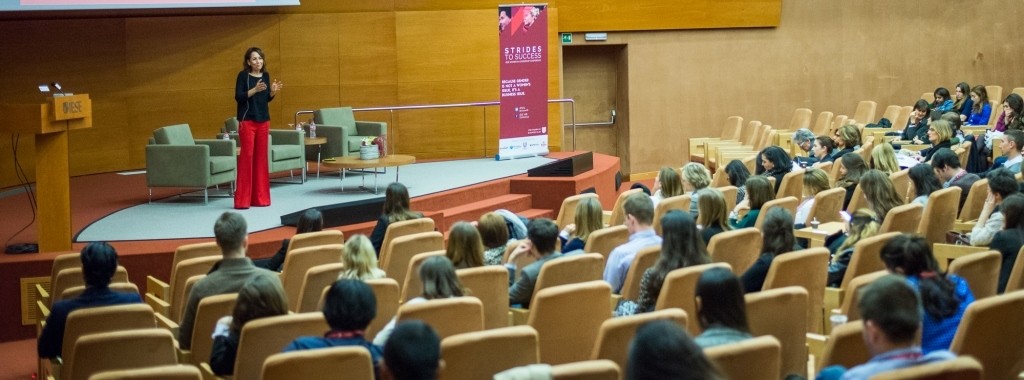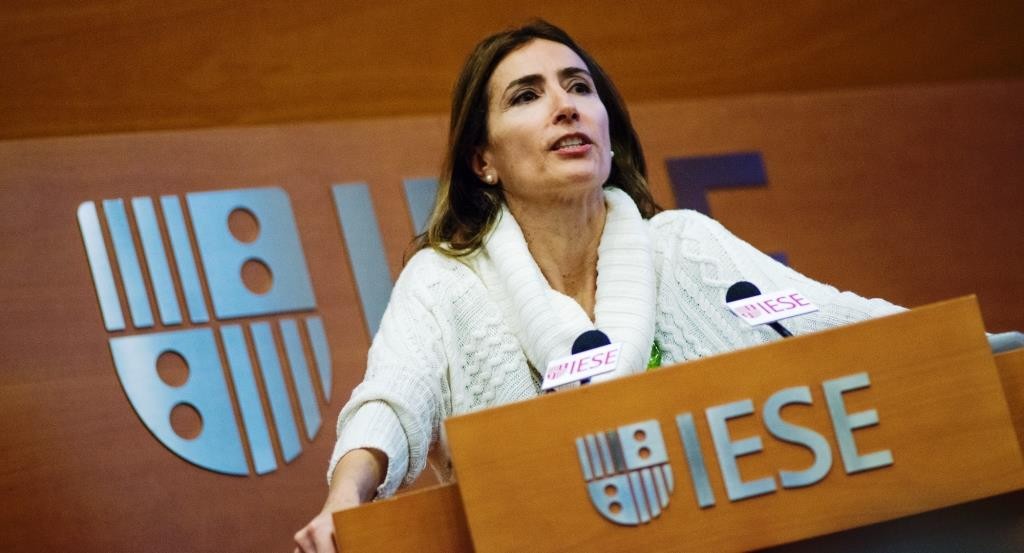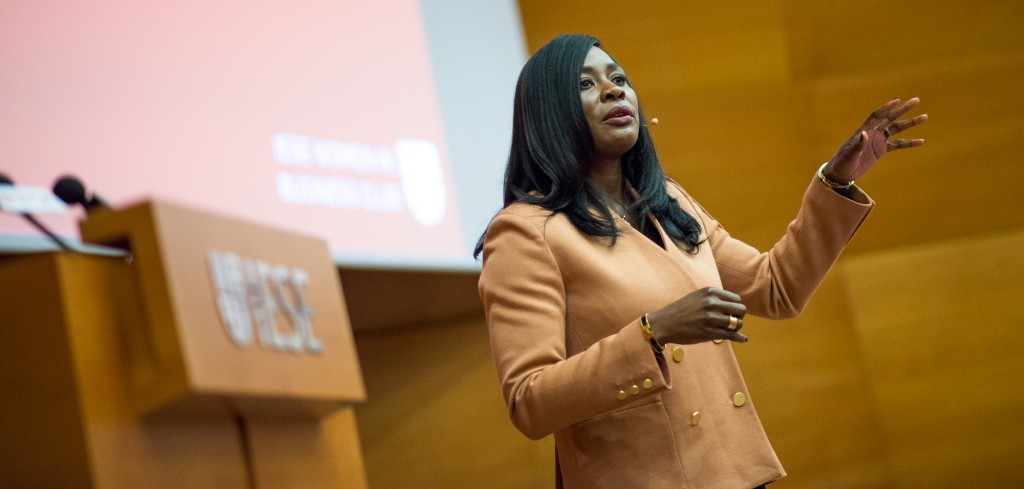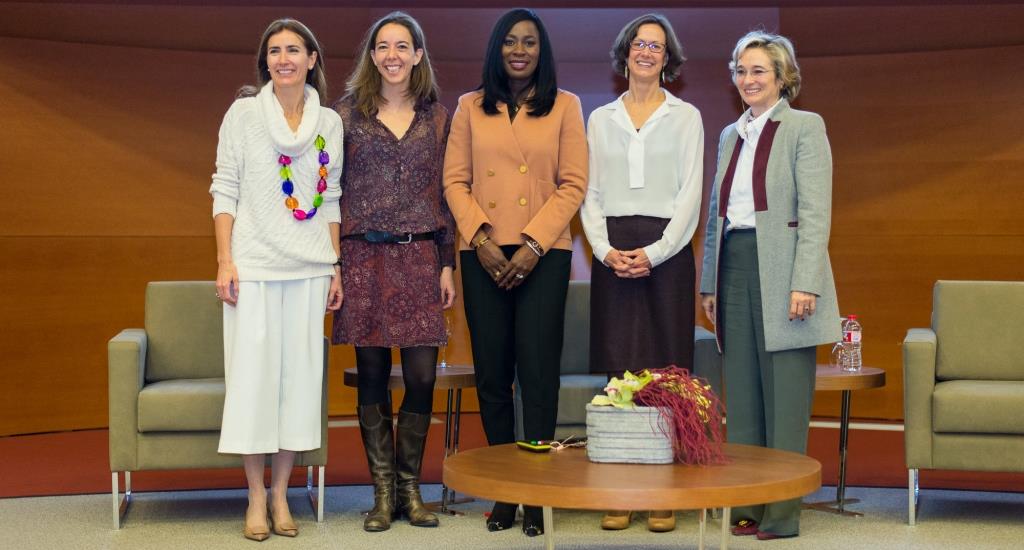On January 27, IESE’s Barcelona hosted the Women in Leadership Conference. The event was organized by the MBA’s Women in Business Club, an exceptional team of female students led by Isabel Villamor and Rocío Orden. Under the motto Strides to Success, the conference brought together speakers from several countries, representatives from a wide array of companies, and managers who reflected a broad range of leadership positions.
Prof. Franz Heukamp opened the event with words that echoed the conference’s emblem: “Achieving quality is a leadership issue, not a women’s issue.” Patrick Gaonach, Iberian zone president of Schneider Electric, outlined a new business landscape defined by a VUCA (vulnerability, uncertainty, complexity and ambiguity) environment. In this context, Mr. Gaonach affirmed that, it’s not a matter of hiring women, it’s a matter of attracting the best talent, which requires special effort. Schneider Electric participates is the HeforShe campaign, a solidarity movement headed by the United Nations that joins together half of human race in support of the other half, for the good of humanity as a whole.
Experiences Across Diverse Sectors
Cristina Badenes (MBA’98), partner of Meridia Capital and Cecilia Méndez, associate in Morgan Stanley, shared their experiences in the finance industry. Ms. Badenes, a mother of four, stated that, without a doubt, her children and husband are her “absolute priority.” One of her children is a girl, and she is very aware of the challenge of being a good role model for her. Ms. Badenes explained that, when interviewing for her previous position in London, she requested a part-time schedule. When the interviewer replied that no such positions existed within the organization, she responded, “Well, then create one!” She told the audience, “Don’t be afraid to ask your higher-ups for what you want. ‘Having it all’ is a myth. Whether you have a little or a lot, the important thing is to be happy with what you have.”

Ms. Méndez observed that the finance industry was aggressive by nature, and both confirmed that proactivity in a woman is often interpreted as aggressiveness. Ms. Badenes clarified that it’s a question of working with the greatest possible intensity. Based on her experience, she upheld that having a family makes women more efficient, although there is a personal price to pay: women with families have to work much more intensely and go without the breaks and rest periods that colleagues without children often enjoy. Both speakers agreed that the amount of hours spent in the office was not synonymous with efficiency.
For Carlota Pi Amorós (EMBA ’09), founding partner of HolaLuz.com, mainstreaming diversity is a strategy that creates value and retains talent. Her team at HolaLuz.com lives like a family. The selection process is extraordinarily long and thorough because they seek professionals who believe that one’s personal life and professional work are not only compatible, but can share the same physical space. From the very first day, when there was only one baby, their offices near the port of Barcelona were equipped with a daycare center. In staff meetings, it is common to see mothers and fathers holding a baby, and conference tables strewn with cellphones and laptops…as well as toys, baby bottles and pacifiers. Ms. Pi is the mother of three daughters. Following one of her pregnancies, in light of the predominant lack of understanding in the business world, she decided to set up a company that embraced a more humane and inclusive model.
Ana Alonso, a key account director at Microsoft and mother of two, spoke on the role that women play in the technology industry. Ms. Alonso believes that great strides have been made in the sector to facilitate work/life balance. She also referred to the divergent leadership styles between men and women, and the greater accessibility to senior management roles for women in a sector where flexibility is key. She added that some women reach leadership positions by imitating a masculine style of management.
“A bilingual company is not one where English is spoken, but rather one where masculine and feminine vernaculars co-exist” – Carolina Schimdt
Corporate Bilingualism: Male and Female Languages
In the words of Carolina Schmidt, the former director of Chile’s National Women’s Service, “A bilingual company is not one where English is spoken, but rather one where masculine and feminine vernaculars co-exist.” Ms. Schmidt underlined the astonishing lack of women on executive boards in most countries, illustrating her argument through a wealth of data points and statistics. In many organizations, not only in Chile but in Europe and the United States as well, the presence of women on corporate boards is purely decorative. She stressed the loss of value and talent that companies face when they remain rooted in the “good old days,” characterized by male dominance in leadership positions and corporate boards that are off limits to women. Many senior managers really don’t believe in the value of female talent, and think that finding qualified women is either impossible or unimportant. They believe that women don’t have leadership abilities because of our “softer and sweeter” manner of speaking. Moreover, they bristle at the notion of the effect women would have on traditionally male-dominated spaces, where the language used—oftentimes blunt or insulting—is typically “mannish.” One need only think of bars and men’s clubs where business deals are made.

On the other hand, Ms. Schmidt pointed out other challenges that women face: two full-time positions (a job outside the home plus taking care of the family); the pressure to be permanently on call; the lack of work/life balance policies in the workplace; low self-esteem (women often consider themselves unqualified for positions of greater responsibility); accusations that they lack ambition because they aren’t willing to relinquish their family life to dedicate themselves exclusively to their professional lives; the absence of positive role models and references (women who adopt a masculine style of leadership who are neither friendly nor pleasant to work with).
It is urgent that steps be taken to ensure that companies don’t squander this wealth of talent. Steps that can be taken, among others: inform and shed a light on the situation; measure and propose quantifiable objectives (you can’t manage what you can’t measure); and work/life balance policies, a greater prevalence of women, work schedules with greater flexibility, work evaluations based on objectives…
A lack of innovation is causing many companies to miss out on this pool of talent. The workplace is in urgent need of change, because human capital is crucial—and women are crucial. Eghosa Oriaikhi (GEMBA ’13), director at Baker Hughes for Europe, Africa and Russia, talked about how to include men in the equal-opportunity conversation. Numerous expressions have been coined to refer to this discussion: gender equality, equal opportunity, gender diversity…
What is the crux of this discussion? We still live in an era clearly dominated by men: women still earn less for the same position, fewer leadership positions are open to women, the belief still exists that women will never reach their full professional development. A series of obstacles have contributed to the current state of affairs: they are structural, institutional and political barriers and conscious or unconscious prejudices.

On the question, “How can men positively impact this situation?”, Ms. Oriaikhi stated that is was a matter of understanding the problem; doing something about it (for instance, being a model for change); being a moral voice since impassive silence is highly detrimental; widening the circle and bringing men into the discussion; breaking the silence (“Speak up: don’t let it happen in front of your eyes”), and seeking help.
She wondered whether “discrimination” was the correct term, because she prefers to speak of “barriers.” It is obvious that there are differences among women, which is why generalizations aren’t helpful. That said, education is the linchpin to responding to questions like “Why are so many sectors so incredibly male-dominated”? She used her own experience as an example. There has never been a man in her current role; none has ever travelled the path that led her to the executive position that she currently holds, and she suspects that she might be confronting a glass ceiling. She got there by not thinking that she was different.
We still live in an era clearly dominated by men: women still earn less for the same position, fewer leadership positions are open to women, the belief still exists that women will never reach their full professional development
I concluded the conference by reminding the audience that barriers are often personal (cement ceilings): self-esteem issues, fear of failure, problems delegating, difficulties negotiating, different networking styles, and the wrong order of priorities, as well as a reminder on the differences between the male and female brain deriving from the XX or XY genetic make-up.
Finally, I invited Harvard Business School Prof. Kathleen McGinn to speak on how we can go about changing our behavior. Prof. McGinn said first, using the right negotiation style and not imitating men. Second, following solid models that promote personal growth, many of which abound among millennials. Lastly, addressing the challenges that equality poses: let it become a topic of discussion in every forum, in every debate and in every type of decision-making process.
The matter of equality is continually evolving, and one that periodically spurs cycles of action and analysis. As long as these cycles consider all points of view, we will be make giant strides in the right direction. Let’s keep the conversation alive!!!







